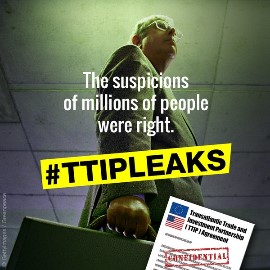#TTIPleaks: Confidential TTIP Papers Unveil US Position
WHISTLEBLOWING - SURVEILLANCE, 16 May 2016
Greenpeace – TRANSCEND Media Service
Leaked text shows attempts by the U.S. to undermine EU environment and health protection laws.
Brussels, 1 May 2016 – Greenpeace Netherlands has obtained 248 pages of leaked Transatlantic Trade and Investment Partnership (TTIP) negotiating texts [1]. The documents unveil for the first time the US position and deliberate attempts to change the EU democratic legislative process.
 The classified documents represent more than two-thirds of the overall TTIP text as of April, at the 13th round of TTIP negotiations in New York. They cover 13 chapters addressing issues ranging from telecommunications to regulatory cooperation, from pesticides, food and agriculture to trade barriers.
The classified documents represent more than two-thirds of the overall TTIP text as of April, at the 13th round of TTIP negotiations in New York. They cover 13 chapters addressing issues ranging from telecommunications to regulatory cooperation, from pesticides, food and agriculture to trade barriers.
Jorgo Riss, director of Greenpeace EU, said: “These leaked documents confirm what we have been saying for a long time: TTIP would put corporations at the centre of policy-making, to the detriment of environment and public health. We have known that the EU position was bad, now we see the US position is even worse. A compromise between the two would be unacceptable.”
Greenpeace identified four main issues of concern:
- Long standing environmental protection is dropped
The “General Exceptions” rule, enshrined in the GATT agreement of the World Trade Organisation (WTO), is absent from the text. This nearly 70-year-old rule allows nations to restrict trade “to protect human, animal and plant life or health“, or for “the conservation of exhaustible natural resources” [2].
- No place for climate protection in TTIP
If the goals of the Paris Summit to keep temperatures increase under 1.5 degrees are to be met, trade should not be excluded from CO2 emissions reduction specifications. But nothing about climate protection can be found in the obtained texts.
- Precautionary principle is forgotten
The US wants the EU to replace the EU’s hazard approach with ‘risk management’, disregarding the precautionary principle, [3] which is enshrined in the EU Treaty but is never mentioned in the consolidated text.
- Open door for corporate lobbying
The leaked documents suggest that both parties consider giving corporations much wider access and participation in decision making.
Jorgo Riss said: “The effects of TTIP would be initially subtle but ultimately devastating. It would lead to European laws being judged on their consequences for trade and investment – disregarding environmental protection and public health concerns.”
Notes:
[1] Greenpeace Netherlands received a confidential document that was possibly edited in order to identify the source of a leak. Greenpeace retyped the document removing modifications that could have allowed to trace the source.
[2] https://www.wto.org/english/docs_e/legal_e/gatt47_02_e.htm#articleXX
[3] The precautionary principle also covers consumer policy, European legislation concerning food and human, animal and plant health: http://eur-lex.europa.eu/legal-content/EN/TXT/?uri=URISERV%3Al32042
Contacts:
Greenpeace EU press desk: +32 (0)2 274 1911, pressdesk.eu@greenpeace.org
For breaking news and comment on EU affairs: www.twitter.com/GreenpeaceEU
Greenpeace is an independent global campaigning organisation that acts to change attitudes and behaviour, to protect and conserve the environment and to promote peace. Greenpeace does not accept donations from governments, the EU, businesses or political parties.
Go to Original – greenpeace.org
DISCLAIMER: The statements, views and opinions expressed in pieces republished here are solely those of the authors and do not necessarily represent those of TMS. In accordance with title 17 U.S.C. section 107, this material is distributed without profit to those who have expressed a prior interest in receiving the included information for research and educational purposes. TMS has no affiliation whatsoever with the originator of this article nor is TMS endorsed or sponsored by the originator. “GO TO ORIGINAL” links are provided as a convenience to our readers and allow for verification of authenticity. However, as originating pages are often updated by their originating host sites, the versions posted may not match the versions our readers view when clicking the “GO TO ORIGINAL” links. This site contains copyrighted material the use of which has not always been specifically authorized by the copyright owner. We are making such material available in our efforts to advance understanding of environmental, political, human rights, economic, democracy, scientific, and social justice issues, etc. We believe this constitutes a ‘fair use’ of any such copyrighted material as provided for in section 107 of the US Copyright Law. In accordance with Title 17 U.S.C. Section 107, the material on this site is distributed without profit to those who have expressed a prior interest in receiving the included information for research and educational purposes. For more information go to: http://www.law.cornell.edu/uscode/17/107.shtml. If you wish to use copyrighted material from this site for purposes of your own that go beyond ‘fair use’, you must obtain permission from the copyright owner.
Read more
Click here to go to the current weekly digest or pick another article:
WHISTLEBLOWING - SURVEILLANCE: